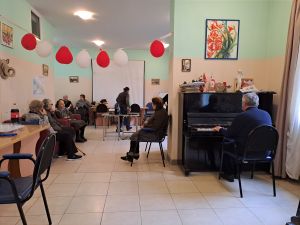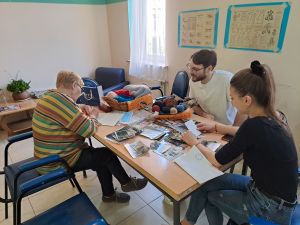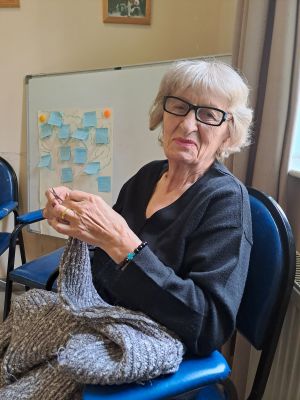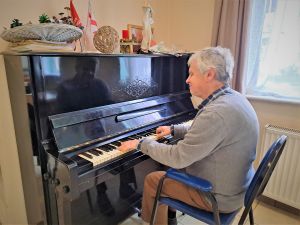Report from Caritas
| Title | Report from Caritas |
|---|---|
| Author | Sofia Camaglia, Clara Furlan |
| Date | 2023-02-27 |
| Project | {{{project}}} |
Caritas is a very active religious organization in Georgia, yet it refrains from anything that 'takes sides' in order to achieve its goal: to help those in need, whoever they may be.
Since February 2023 we have been collaborating in its activities as volunteers. Primarily we take care of the elderly and children with family problems. Our work takes place in Didube, in the largest of Caritas' facilities in Tbilisi, where there are offices, the elderly section, the children's section, the orphans' section, a dozen art and vocational workshops, a canteen open to all, a clothes sorting center, a church and outdoor play spaces, including a soccer field.
A typical day of ours starts at 1.30 p.m., for the preparation of tables and dishes for the elderly's lunch. There we help Sister Monika, originally from Poland but in Georgia for more than 20 years: she has been through a lot here, from the wars of independence to the Covid pandemic. Ala, a janitor dedicated to cleaning the institute, often helps her with these tasks, but there is a lot of work and the 15 or so elderly who attend Caritas daily are demanding. After that, we stay for a few hours to entertain the nice group by chatting and dancing. There are two gentlemen playing piano, Volodya and Giorgi, so in the common room, we enliven their afternoon a bit by dancing together to opera and 60s-70s Russian and Georgian music.

The group is diverse, with a majority of women. They are over 80 with strong and complex life stories, mostly from Georgia, Armenia, Ukraine, Russia and Belarus. Unfortunately, the language gap is deep, despite the fact that they don't care much, as they often continue to speak to us in Georgian and narrow Russian dialect even if we tell them we don't understand.
Many of them have sincere affection for us and care to make us part of their vicissitudes, even if it means speaking in gestures. Raisa, for example, bought a little notebook to learn Italian so that she could communicate with us. One day, she took us by the hand and led us to the room where she sews. She moved the balls of wool and opened two paper packages containing her photos: she showed them to us one by one, telling us about them. Broken with emotion, she stopped when she found the photo of her first husband, married when she was 19. They separated, but she did not tell us why. She had an equally strong reaction when she showed us the photo of her son: the muscles in her face hardened, painting a stern expression on her face, which she justified by saying that she had a son, but now has none. Just a few days earlier we were told that she had been beaten and kicked out of the house by exactly the latter. These are intense, very delicate moments of intimacy.

Volodya, on the other hand, was a partisan. When we meet him in the hallway he always stands at attention tapping his heels and shouting "wellà," playfully. He is over 90 years old and has been in numerous wars, for which he says he fought in Austria, Croatia, and Georgia. He has his own peculiar and grotesque theories about the people who frequent Caritas, but he remains a lovable guy. He has been here for 20 years.
Zima was a principal of a Tbilisi school whose name we could not figure out. The elegant bearing and the care in clothing encouraged us to think that this was the case. She came to Caritas to avoid loneliness, and her only concern as she knits is to find someone in her family whom she can marry to us.

Karina, for her part, lives on the street, has no fixed abode, but her dream is to leave for Italy and become a singing teacher. She is a lady with quirky ways and is always a bit on her own. Sister Monika told us that during the time of the Covid pandemic - so the elderly could not go to the cafeteria and she had to travel to bring meals to each of their homes - Karina was always hard to find, because she would not say where she would be and would be found in different places every day.
Finally, pianist Volodya, a Georgian who lived in Ukraine and studied at the conservatory. He gladdens our afternoons with his virtuosity, so much so that just singing a song to him causes him to play it using the black and white keys. He is an introverted gentleman, but very appreciative and affectionate: his face never lacks a shy smile, which embellishes his heavenly eyes. Sitting comfortably on the couch, a lady from the Institute, waves us over and sighs that Volodya never married to be near his sick mother: "he was a handsome man, what a pity".

With the help of Sister Monika and other volunteers who come occasionally and speak English, we are managing to delve into their stories. It is not an easy job, because before the language, what is needed is to create a relationship of trust and friendship that will entice the elderly to share their private stories, which they very often tell with suffering.
Once we say goodbye to them and leave the door of the institute behind us, we cross a small courtyard and enter another one, which opens to flights of stairs leading to the children's after-school area. It consists of about 8 classrooms, where children play or study according to the day's schedule. At either end of the hallway are an art lab on one side, and a theater and room used for traditional Georgian dance classes on the other. There are desks, blackboards, games, and books in each of the rooms, but very often the children are taken outside to play, except on rainy days, of course. The service runs from morning until evening, and is designed to relieve struggling families of the thought of children, and to get them off the streets, if not from abusive parents or distressed backgrounds. For example, there are three little brothers aged 5 to 7 living in an abandoned train car, alone with their mother struggling to find work to feed them.
Sometimes the sanitary conditions are equally critical. For this reason, Caritas provides a workshop for aspiring hairdressers, and cuts hair (as well as washes) all children and parents free of charge. There are also workshops in carpentry, plastic arts, ironworking, and others, but we do not participate in them. Actually we could, but the children so need to play and have our attention and affection, that simply following them in the activities they already do with teachers seemed unfair.
The work at Caritas is a lot and tiring: sometimes we leave the salmon-pink structure of Didube totally distraught, but it is certainly rewarding, and fatigue has never made us turn back from our decision to volunteer here.









